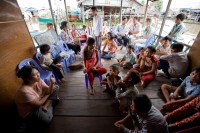
This is the second in a series of posts highlighting cases of statelessness throughout the world. Click here for more information about the series.
Cambodia’s main ethnic groups consist of the majority Khmer, as well as the minority Chinese, Cham, Vietnamese, and many other minority groups, including indigenous people.
It is estimated that the ethnic Vietnamese make up approximately 5% of Cambodia’s total population today. Apparently stateless and a small group, members face daily civil and human rights abuses by local Khmer authorities.
There is insufficient documentation that allows us to pinpoint exactly how far back in history ethnic Vietnamese ancestry in Cambodia goes. However, in ongoing research with people of the ethnic Vietnamese group in the Kampong Chhnang province, many claimed that their families had been living in Cambodia for decades; various people in their 40s to 70s claimed that they were sure that their great grandparents lived on this land.
In addition to their possible stateless status,1 throughout modern history, the ethnic Vietnamese has been discriminated by every government that has ruled Cambodia. Discrimination existed under the post-French colonization, Sihanouk era, and increased significantly under Lon Nol’s government.
Once the Khmer Rouge overthrew Lon Nol and took over government, the ethnic Vietnamese was nearly wiped out as a consequence of the Khmer Rouge’s genocidal purges against the population. The Khmer Rouge dismissed the fact that the ethnic Vietnamese saw themselves as Cambodian people (due to the fact that they had lived in the region for decades) and accused them of being Vietnam’s spies and internal enemies who were going to help Vietnam’s takeover of Cambodia from the inside. Such discrimination would further lead Khmer Rouge killers to accuse non-Vietnamese victims of having “Khmer bodies, but Vietnamese minds.”
Since the Khmer Rouge regime fell, outright massacres of the ethnic Vietnamese have ceased. However, ongoing civil and human rights abuses against the group continue.
Based on what available research can tell us so far, the ethnic Vietnamese population appears stateless.2 They are not registered citizens in either Cambodia or Vietnam.3 It appears that Cambodia does not recognize the group as Cambodian citizens due to historical discrimination, as well as the persistent political belief that they are Vietnamese citizens who are spies and are infiltrating Cambodia from within – the rest of Cambodia’s population disregard that members of the group have ancestry that spans decades and that their loyalty in fact stays with Cambodia. On the other hand, Vietnam does not recognize the group as being native Vietnamese citizens, presumably because the group’s members were not born in or had lived for an extended period of time in Vietnam.
The consequences of the ethnic Vietnamese’s seeming statelessness results in severe limitations to the group’s political, economic, and social rights. Specifically, statelessness status of the group means that members:
- Cannot own land or property;
- Cannot be formally employment (particularly in cities);
- Cannot partake in banking activities (e.g. opening an account or obtaining loans);
- Cannot vote;
- Cannot access the judicial system (e.g. lawsuits);
- Cannot access social services (e.g. health care and education); and
- Cannot register marriages, births, or deaths; and
- Cannot travel freely (in-country, across borders, or overseas).
Thus, though the most difficult period to date for the many members of the ethnic Vietnamese minority group – the Khmer Rouge’s genocide of its people – is over, they still face civil and human rights challenges due to their lack of citizenship.
Notes:
1. More research is needed before we make a claim that the ethnic Vietnamese as a collective group is stateless; as of now, we can only claim statelessness on an individual, case-by-case basis.
2. On account of researchers being unable to prove any previous acquisition of nationality under Cambodian laws.
3. Again, research on this group is limited, so we cannot assume that all ethnic Vietnamese lack citizenship; it is therefore difficult to make a claim that the collective group, as a whole, is stateless.
